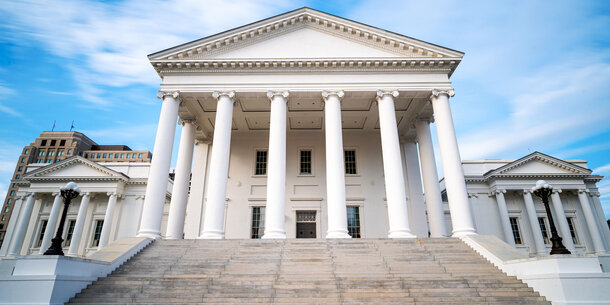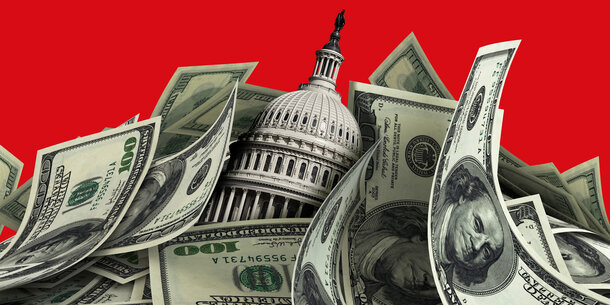From the beginning, it was probably sadly inevitable that a major Democratic presidential contender would resort to deploying a super PAC in an effort to wrest the nomination.
Unlike regular PACs, which rely on capped donations from individuals, super PACs can raise unlimited amounts of money, including from corporations and unions.
While both parties have avidly embraced super PACs for their general election presidential campaigns and congressional races, the Democrats had up to now upheld their commitment to overturning the Supreme Court’s Citizens United decision by disdaining megadonors in presidential primaries.
That proud record abruptly ended Thursday when Joe Biden’s campaign gave a wink and a nod to supporters thirsting to set up a super PAC to boost him in the primaries. Since super PACs cannot directly coordinate with the candidates they support, Biden’s deputy campaign manager, Kate Bedingfield, would only say, “It is not surprising that those who are dedicated to defeating Donald Trump are organizing in every way permitted by current law.”
Those understated words were enough to liberate longtime Biden supporters like former aide Larry Rasky who have been impatiently waiting for the green light from the campaign. Biden’s prior stance — shared by all major Democratic contenders — was that he would repudiate any efforts to unleash a super PAC on his behalf.
Biden, to be sure, has a better excuse than his Democratic rivals, since the Donald Trump campaign has spent more than $5 million in the early primary states explicitly attacking the former vice president. And Trump’s obsession with pressuring Ukraine to dig up dirt on Hunter Biden suggests that the president believes he is targeting his likely Democratic opponent.
But only the terminally naive would fail to grasp that other motivations also lurk behind Biden’s super PAC switch. The third-quarter campaign spending reports show that Biden has burned through more than three-quarters of the $38 million he has raised for his campaign. Since we are still in the phase of the campaign when candidates should be hoarding cash for the primaries, it is telling that three other major contenders have much more money in the bank. Sen. Bernie Sanders, Sen. Elizabeth Warren, and Pete Buttigieg all have a much more robust online fundraising operation than Biden and, as a result, boast more than double the cash on hand.
A cockamamie primary calendar accentuates the fundraising pressures faced by all Democrats dreaming of the White House. After February contests in four small states — Iowa, New Hampshire, Nevada and South Carolina — the campaign schedule hits warp speed on March 3. With primaries that day in 14 states, including California and Texas, even the richest campaigns will be hard-pressed to maintain a TV presence everywhere along with digital advertising. This front-loaded schedule is a side effect of the historic inability of the political parties to figure out a way to pressure the states not to hold their primaries on the same day.
Now that Biden has taken the plunge, will other major 2020 Democrats feel emboldened to encourage their supporters to organize super PACs? (At the moment, single-issue crusader Andrew Yang has fostered the creation of a super PAC and Sen. Cory Booker has a largely dormant one). And, in the heat of the primaries, will the Biden super PAC attack his Democratic rivals? That was the scorched-earth model that Jeb Bush’s $120-million 2016 super PAC followed in excoriating GOP rival Sen. Marco Rubio.
The Biden campaign insists that the former vice president is steadfast in his support for a constitutional amendment to reverse Citizens United. And, of course, rival campaigns have charged Biden with hypocrisy. As Faiz Shakir, who is Sanders’ campaign manager, put it in a press release rushed out within an hour of the Biden announcement, “The former vice president has been unable to generate grassroots support, and now his campaign is endorsing an effort to buy the primary through a super PAC that can rake in unlimited cash from billionaires and corporations.”
But the Biden turnabout illustrates a continuing problem in the frustrating long-term quest to drive megadonors out of politics. Candidates may support campaign reform in theory, but self-interest is what prevails in practice.
A prime example was the 2008 decision by Barack Obama to become the first presidential nominee to reject public financing for the fall campaign. Obama cynically and correctly calculated that he could raise far more than the $84 million that would have been provided by the federal treasury. In contrast, John McCain stayed within the federal funding system established by the post-Watergate reforms.
The lingering hope is that Biden’s use of a super PAC will be limited to simply countering the Trump TV and digital ads directed at him. But having opened up the spigot of unlimited super PAC contributions (in contrast the $2,800 maximum donation to the primary campaign), the temptation by Biden supporters to spend what it takes may prove irresistible.
It just goes to show that no aspect of politics is immune from the big-money consequences of Citizens United and the breakdown of rules enforcement by the Federal Election Commission. Money, alas, talks and voters are compelled to listen.
The views expressed are the author’s own and not necessarily those of the Brennan Center.



